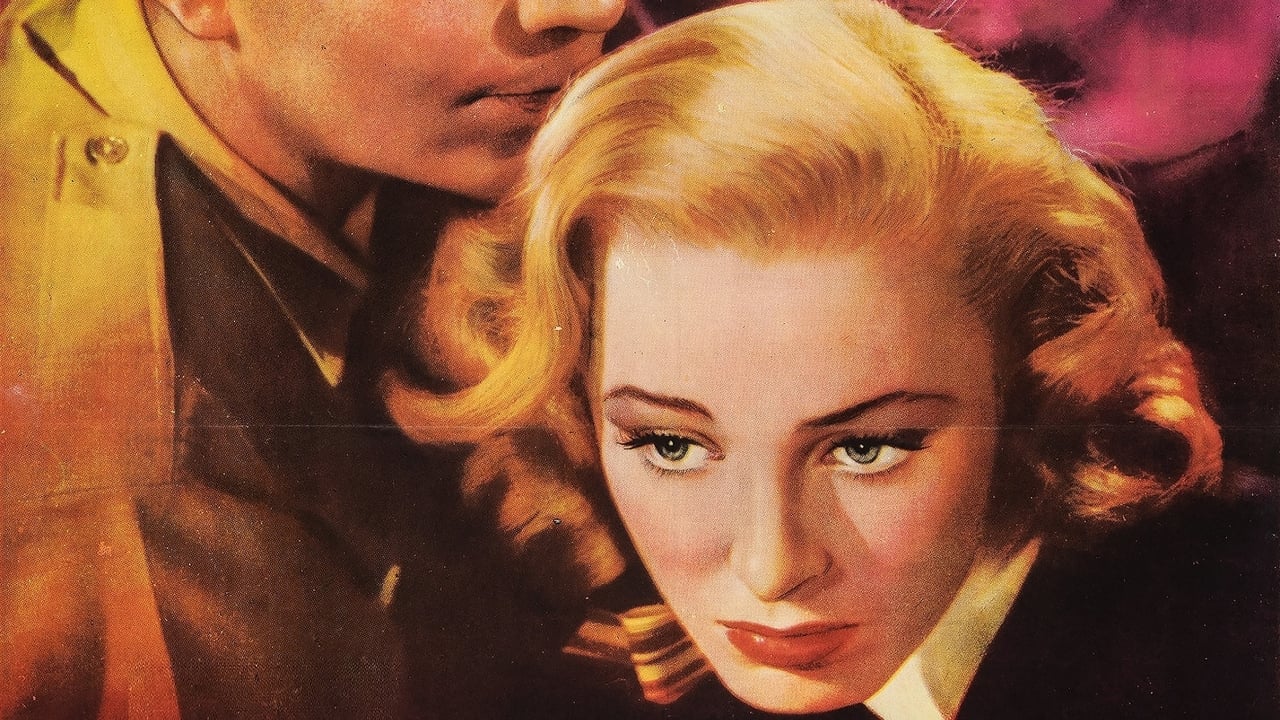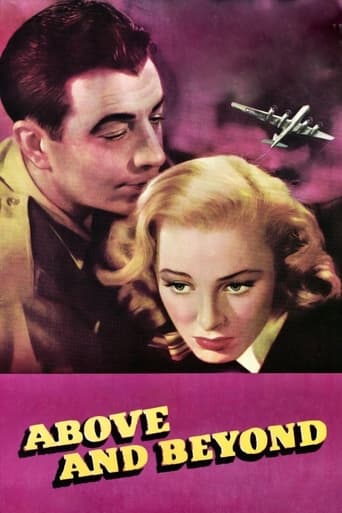

Charming and brutal
... View MoreBad Acting and worse Bad Screenplay
... View Morea film so unique, intoxicating and bizarre that it not only demands another viewing, but is also forgivable as a satirical comedy where the jokes eventually take the back seat.
... View MoreYes, absolutely, there is fun to be had, as well as many, many things to go boom, all amid an atmospheric urban jungle.
... View More"Above and Beyond" stars Robert Taylor and Eleanor Parker and chronicles the story of Paul Tibbets, the man who dropped the bomb on Hiroshima in 1945. The event today, seen with modern eyes, is more unsavory than it was to people who lived in the midst of World War II. I watched the film with a skewed perspective unheard of in the '40s, as I interviewed Hiroshima survivors some years ago and discussed the event and their various health problems with them. Known as the "hibachi," they are human beings like everybody else. But as we all know, in war, human life is cheap, especially as far as warring governments are concerned.The story as told in "Above and Beyond" is factually correct. The focus is not just on the technical details of outfitting the planes, the training, the secrecy, the testing, etc., but also on Tibbets' personal life. I read Tibbets married in 1953 or 1954, but I did not learn if he had a wife at the time of Hiroshima. In this movie, he had a wife and two small children. The high security of the base, the constant pressure of Tibbets' work, and the weight of the act he was to perform put a strain on his marriage and his relationships with friends. I suspect most of the personal life aspects of the film were heavily fictionalized. First of all, in the movie, the character of Tibbets is deeply conflicted about his assignment. In real life, Tibbets never had a moment of regret. Secondly, one would think a military wife would have understood that if security was so high and her husband was abrupt and tense - and there was a war on - there must be a reason other than "he's changed." Instead, he is accused by her of "playing it too big." She even takes her confusion to one of his bosses, who, instead of saying, "Your husband is working on something important and is under a lot of pressure," gives her no help at all. But that was probably to get her off of the airbase.Robert Taylor was about 40 when this movie was made. It was a different world then - cigarettes and the lack of an eyelift robbed him of his boyish beauty, but he was still ruggedly handsome and does well in the role. Taylor wasn't a great actor, nor was he a bad one. Like his 20th Century Fox counterpart, Tyrone Power, he suffered at the hands of the critics because of his outrageous good looks, but he was always believable in the right role. Eleanor Parker is lovely and effective as his wife.The film was obviously meant to show the action of dropping the bomb and to put the character of Tibbets in a sympathetic light. The stars are likable, it's thought provoking, and of some interest. It has, of course, the Robert Alda as Gershwin moment - you know, "I'll write a rhapsody - a Rhapsody in Blue" when Tibbets is asked what he wants to name the plane, and he decides on "Enola Gay." It's for historians to say if in actuality this horrendous event by the Enola Gay shortened the war and saved lives, and they've been arguing about it for years. I can't say. I didn't live through the war; I just interviewed some of its victims.
... View MoreTaking off in the early morning hours of August 6, 1945 on the giant B-29 air base in Tinian in the Mariana Islands the super-fortress "Enola Gay" is on a secret mission to end the Second World War, and end it with a bang.Within sight of it's target the two escort bombers along the "Enola Gay" peal off from formation and head home as it flies over the Japanese port city of Hiroshima. At exactly 8:15 AM the Enola Gay drops a uranium based Atomic Bomb that explodes with an blinding air-burst, some 1,600 feet above ground zero, wiping out the city and 100,000 of it's inhabitants in less then a minute. With another Atomic bombing of the Japanese city of Nagasaki three days later the war in the Pacific as well as WWII ended with the Japanese government surrendering unconditionally to the allies.The movie "Above and Beyond" reconstructs the development of the Atomic Bomb as well as the means to deliver it, the B-29 bomber. It goes back to 1943 in North Africa where Let.Col. Paul Tibbets, Robert Taylor, is secretly chosen by the top military brass in the Pentagon to be the man to fly the B-29 that's to drop the bomb.Tibbets a maverick in his dislike of his superiors in sending him and his fellow pilots out on suicide missions against the Germans in Tunisia is just the man that their looking for to perfect the flying of the new giant B-29 bomber. The super-fortress is considered to be a death trap at the time by USAAF pilots but was the only plane capable of carrying a 9,700 pound Atomic device that if dropped and successfully detonated ,on either Germany or Japan, could very well end the war Back in the states at Wendover AFB in Utah Tibbets is told by his friend and commander of the base Maj. Gen. Vernon C. Brent, Larry Keating, what his mission is to be and to keep it secret not only from his fellow airmen but also his wife Lucey, Eleanor Parker. This causes so much tension between the two that it almost wrecks their marriage. The sweet and lovable Tibbets quickly becomes an unfeeling robot to his wife and two young children overnight. Worst of all is that Tibbets has to keep his feelings, about being the one to drop the bomb, to himself which almost leads him to have a breakdown. The movie goes on with the Atomic Bomb being perfected at the Los Alamos Manhattan Project army base in New Mexico and with the secret but successful testing of the bomb in the New Mexican desert outside of Alamogordo a town with a name eerily similar to Valley of Armageddon in the Bible, where the last great war is to be fought between Good and Evil, on July 16, 1945. After the successful Atomic Bomb testing Tibbets and his B-29 crew are then flow to the Tinian island B-29 air base to write the final chapter of the Second World War.Tense filled and extremely accurate movie about the dropping of the Atomic Bomb on Hiroshima, were actually shown what the Atomic Bomb looks like and told how it works in the film. Robert Taylor gives one of his best performances as Lt.Col, and later full Col, Paul Tibbets as we see him overcome his fear and what seems guilt in piloting the B-29 super-fortress "Enola Gay",named after his mom Enola Gay Tibbets. Flying some 2,000 miles and six hours to drop a bomb that would eventually kill more people then almost any of the 1,000 plane raids, with the possible exception of the allied 1945 Valentine Day fire bombing of the German city of Dresden, on Japan or Germany during WWII changed Co. Tibbits life forever. Eleanor Parker as Let.Col Tibbets' pretty and long suffering wife Lucey is extremely effective in her concern for her husband who seemed to have turned into an unfeeling zombie since he was assigned to the secret Wendover AFB. Lucy later realizes, after the announcement of the dropping of the A Bomb and Tibbets being the pilot of the B-29 that dropped it,why her husband acted that way to her and his friends. Tibbets had to keep all that about his secret mission over Japan inside him which ate him up alive."Above and Beyond" is unusually even-handed in it's depicting of the devastating Atomic Bombings of Japan. The films unflinching anti-war and anti-nuke message, for as movie made at the hight of the Cold and Korean War back in 1952, seen now has all the impact and effect on it's audience as it did back then.P.S it should be noted that the ultra-secret 509th Atomic Bomb Group, the only Atomic Bomb unit of any air force on earth at the time, that Col. Tibbets Atomic Bomb fitted B-29 "Enola Gay" was part of made the news again two years later. The very same 509th was involved in the July 1947 "Roswell Incident" where there was a supposedly government cover up of an alien controlled spaceship that crashed in that same desert where the testing of the first Atomic Bomb took place place in the summer of 1945!
... View MoreI just finished watching "Above and Beyond" and could not believe what a wonderful overlooked film this is. Robert Taylor as Col. Paul Tibbets is amazing. What a horrible job he had to do, to drop the atomic bomb on Hiroshima ending World War Two. His life was nearly destroyed by this call to duty. Eleanor Parker is great as his wife, Lucey. She loves him, they have two children, and there life seems idyllic, until he is given this horrible task. Top secret, no talking, no telling, and certainly no way out. Duty comes before anything even the love of his wife and his children. He becomes sullen, withdrawn, and unable to give any affection to her, and in the pursuit of duty almost loses everything that means anything to him. James Whitmore is the aide that has to keep all together and his performance is one of restraint and conviction. I don't get why Taylor was always overlooked by the Academy, first for "Johnny Eager" then for "Waterloo Bridge" and then at the height of his maturity, "Above and Beyond." What a insult to this remarkable performer to never get his due as an excellent actor. This film gives us a look at the personal devastation of the private Paul Tibbets, and somehow we can understand that if the bomb had not been dropped, many more lives would have been lost. A great film, with insight and daring.
... View MoreReal good work. Its straight ahead, no frills film-making had me in its grip every step of the way. Just a good old-fashioned major studio A picture; it's like tooling around in a luxury car. And I don't care what anybody says - Robert Taylor was a fine actor. I've seen a number of his films now and he hasn't given a bad performance yet. It is a tad disconcerting to have Mr. McGoo playing General Curtis LeMay, but it's a small part and I let it slide.
... View More